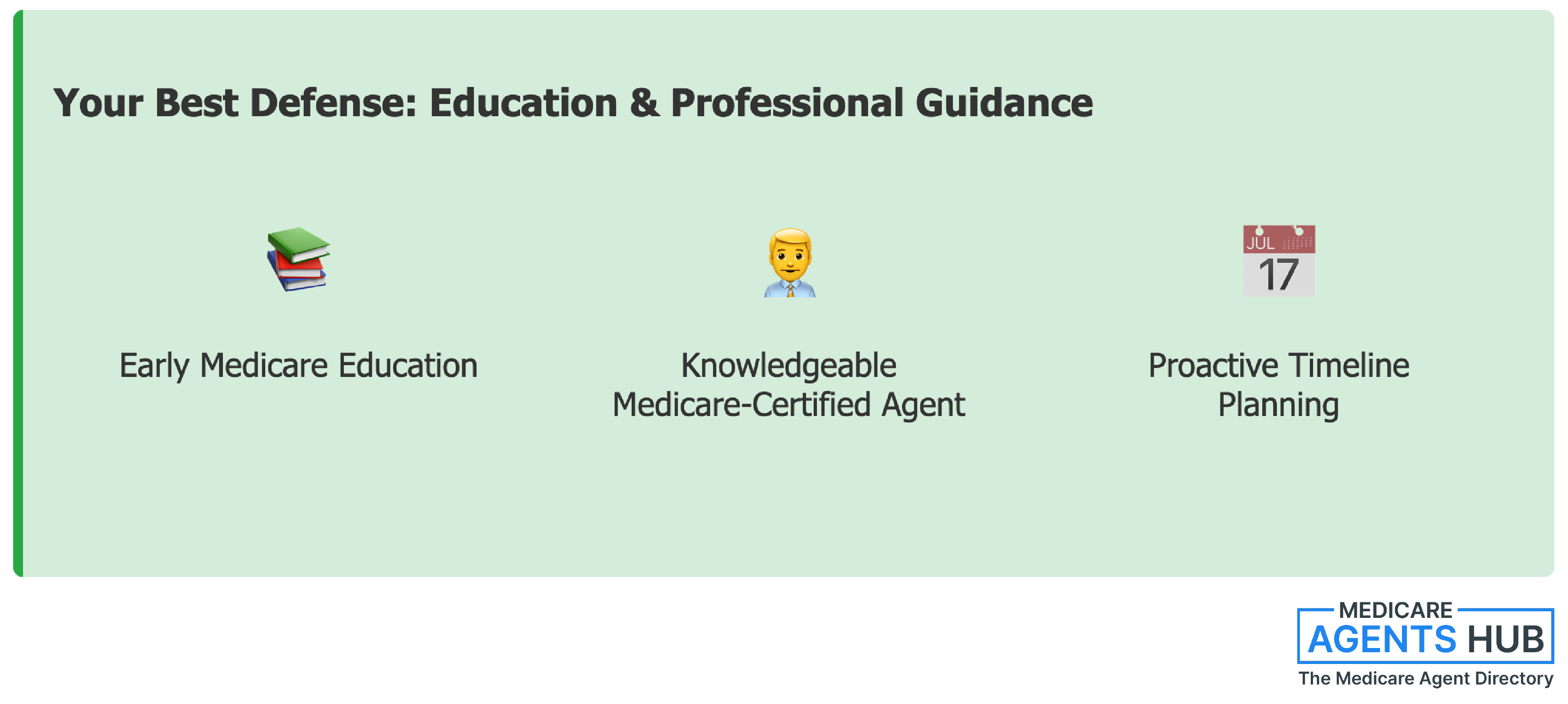Real Stories: Why Some Seniors Pay Lifelong Medicare Part B and Part D Penalties

-
April 20, 2025
What Causes Lifelong Medicare Penalties for Seniors?
At Medicare Agents Hub, we believe that the best insights come straight from the experts on the front lines — licensed Medicare brokers who help seniors every day. To shed light on why some seniors end up paying lifelong penalties for Medicare Part B and Part D, we gathered real stories and advice directly from these experienced agents.
Lifelong Medicare penalties often catch seniors by surprise. Missed deadlines, confusing rules about Creditable Coverage, and a lack of clear information can lead to extra costs that never go away. Based on the firsthand experiences shared by our brokers, this article explores the most common reasons why penalties happen and how seniors can avoid them with the right knowledge and support.
How Lack of Education and Guidance Triggers Penalties
When it comes to Medicare enrollment, what seniors don't know can cost them for life. One of the most common reasons for lifelong Medicare penalties is simply a lack of education, such as not knowing the rules, the deadlines, or who to trust for accurate information.
Several brokers shared that many seniors never received the proper guidance early on. They weren’t aware that missing enrollment windows could result in permanent financial penalties, or that certain types of insurance didn’t count as Creditable Coverage under Medicare rules.
One broker explained that "lack of appropriate retirement planning education" was a major factor behind the penalties they see. Without a solid foundation of Medicare knowledge, seniors can easily make costly mistakes. Attending Medicare 101 seminars or seeking advice months before turning 65 can make all the difference but too often, those opportunities are missed.
Another agent described how seniors bypass free professional help, thinking they can figure it out on their own. "Knowledge is powerful," the broker emphasized, but ignoring free resources like agent counseling often leads to regret later.
In other cases, seniors simply didn’t realize they needed help. One broker noted that misleading information from employers or plan administrators left seniors completely unaware of enrollment requirements. Without someone to guide them, many didn't even know penalties existed until it was too late.
Having a knowledgeable Medicare-certified agent on your side can prevent these mistakes. As one broker put it, finding "a good agent to work on your side" is often the difference between a smooth enrollment and a lifetime of extra premiums.
Ultimately, education and early action are seniors' best defenses. The brokers’ real-world experiences make it clear: when seniors have access to the right information at the right time, they can avoid penalties that would otherwise haunt them for the rest of their lives.

How Missed Deadlines Create Medicare Penalties
Timing is everything when it comes to Medicare. Several brokers shared that one of the biggest reasons seniors face lifelong penalties is simply because they missed key enrollment deadlines — often without even realizing the consequences.
Medicare gives seniors a specific window to enroll, called the Initial Enrollment Period (IEP), which spans seven months around their 65th birthday. Missing this window without qualifying for a Special Enrollment Period (SEP) can trigger penalties that never go away. As one broker explained, "the penalties are based on WHEN a person signed up for Part B or D," and delaying enrollment comes with a price.
The penalties can add up fast. One agent shared that Part B premiums increase by 10% for every full year a senior delays signing up. For Part D, the penalty adds about 1% per month you go without prescription drug coverage after becoming eligible. Even short delays can become very expensive over time, and once the penalties are applied, they stick with you permanently.
The 63-day rule was also highlighted by several brokers. Seniors who go 63 days or more without creditable prescription drug coverage after their Medicare eligibility begins will face a Part D penalty. One broker detailed that Medicare "keeps track" of every uncovered month, even if the senior doesn't feel the impact right away.
Many seniors are caught off guard because Medicare doesn’t immediately apply the penalties. As one agent explained, penalties may only appear later, after the senior eventually enrolls, but the clock had already been ticking.
Missing even one critical deadline can lead to penalties that last a lifetime. These real-world accounts serve as an important reminder: seniors should ask questions, act early, and confirm their Medicare enrollment well before their deadlines expire.
The Danger of Misunderstanding Creditable Coverage
Many seniors who end up paying lifelong Medicare penalties had good intentions — they simply misunderstood whether their existing insurance qualified as Creditable Coverage. Unfortunately, that misunderstanding can have permanent financial consequences.
Several brokers emphasized how common it is for seniors to assume they are covered when they’re not. One agent explained that unless you have true Creditable Coverage, delaying Part B or Part D enrollment will result in a penalty that stays with you for life. It's not enough to simply have "some kind" of insurance, it has to meet Medicare’s specific standards.
Another broker warned that if seniors don't have Creditable Coverage when they turn 65, they need to activate Part B and Part D immediately. Waiting without the right coverage triggers penalties that Medicare tracks carefully. Even if the senior isn’t notified about it right away.
Timing also plays a critical role. As one broker pointed out, seniors need to start Part B coverage within three months of turning 65 or after losing credible employer coverage. For prescription drug coverage, Part D enrollment must happen within 63 days of eligibility to avoid penalties.
Misunderstandings about employer plans, retiree benefits, or even COBRA coverage can cause seniors to delay Medicare enrollment when they shouldn't. One agent explained that some seniors "overestimate their existing coverage," thinking they are safe, only to discover months or years later that penalties have quietly accumulated.
Verifying coverage status early and with a Medicare-certified professional can prevent costly mistakes. Seniors who take time to confirm whether their insurance meets Creditable Coverage standards can avoid penalties that otherwise would follow them for life.
Medicare Enrollment Misconceptions That Cause Penalties
Even when seniors are trying to do the right thing, simple misconceptions about Medicare enrollment can lead to lifelong penalties. Several brokers shared how easily seniors misunderstand the rules and how those misunderstandings can turn into costly mistakes.
One common misconception is thinking that Medicare Part B or Part D isn’t needed right away. As one broker explained, some seniors believe they can delay enrolling because they "think they don't need it" but missing deadlines can result in penalties that never go away.
Others assume that their existing insurance will protect them. Brokers shared that many seniors "overestimate their existing coverage," not realizing that unless it meets strict Creditable Coverage standards, Medicare still considers them uncovered. Even seniors with retiree plans or COBRA may face penalties if their coverage doesn't qualify.
Several brokers pointed out confusion around timing rules as well. Seniors often don’t realize they need to start Part B coverage within three months of turning 65 or after losing credible employer coverage. For Part D, they must enroll within 63 days of becoming eligible. Missing these windows, even unintentionally, can trigger penalties that increase the longer they wait.
Will I be penalized if I do not enroll in Medicare when I turn 65?
Yes, you may be penalized in two ways or reasons. If you don't have credible health insurance coverage, you will be punished for not having Part B once you turn 65; this is called the Part B enrollment penalty, applicable if you don't have credible health insurance in place. Second, you will be penalized if you don't have credible health insurance with prescription drug coverage in place by the time you qualify for Medicare. You must pay these penalties each month for the rest of your life.Another important point highlighted by brokers is that Medicare doesn’t assess the penalties immediately. Seniors might think they’re fine because nothing happens right away. But behind the scenes, Medicare is tracking months without coverage and penalties will be applied later when enrollment finally happens.
Misunderstanding the enrollment process, even slightly, can lead to financial consequences that last a lifetime. Seniors who take the time to ask questions, verify their coverage, and understand their enrollment windows can save themselves from a permanent and unnecessary burden.
How Seniors Can Avoid Lifelong Medicare Penalties
The real-world experiences shared by licensed brokers show one thing clearly: lifelong Medicare penalties are avoidable, but only with the right knowledge, timing, and support.
Seniors often fall into the penalty trap because of missed enrollment deadlines, misunderstandings about Creditable Coverage, or simply believing misinformation from unreliable sources. Sometimes, it’s a lack of awareness. Other times, it’s trusting that existing insurance is enough without confirming the rules. And in many cases, seniors just didn't realize how critical timing is until it was too late.
The good news is that these outcomes are preventable. Early education, professional guidance, and a clear understanding of Medicare’s enrollment rules can protect seniors from a lifetime of extra costs. Seeking advice from experienced, Medicare-certified agents before deadlines pass makes all the difference.
At Medicare Agents Hub, we believe seniors deserve better. They deserve clarity, support, and the chance to make informed decisions that safeguard their financial future.
By learning from these real stories, more seniors can avoid costly mistakes and move confidently into their Medicare years without unnecessary penalties hanging over them.
